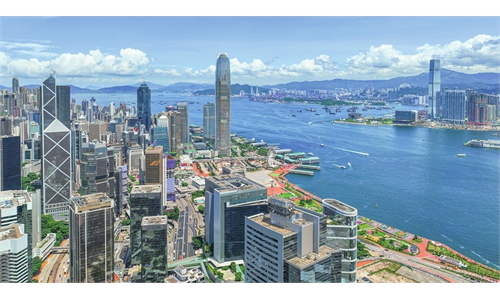
The view of Hong Kong Photo: VCG
The financial chief of the Hong Kong Special Administrative Region (HKSAR) on Wednesday unveiled the budget plan for 2024-25, outlining concrete measures to bolster confidence and create favorable conditions for the regional economy amid a complex global geo-economic situation.
The plan, which emphasizes attracting strategic enterprises and supporting the property and stock markets, among other goals, aims to leverage the HKSAR's greatest advantage with the solid backing of the central government and its connectivity to the world. Such an advantage means a bright outlook for the city in the long run, experts said.
When introducing the budget, HKSAR Financial Secretary Paul Chan Mo-po noted a difficult economic environment amid intensifying geopolitical tensions and the rise of unilateralism and protectionism as well as fierce competition, but he also painted a bright picture for the region's development.
"Hong Kong's economic outlook is bright. Despite a host of prevailing challenges, we will find infinite opportunities ahead, as long as we stay on top of global trends and dare to explore," Chan said, while focusing the budget on bolstering confidence and supporting people and enterprises, among other priorities.
To boost confidence, Chan announced plans to attract enterprises, capital and talent on all fronts. He revealed that more than 10 strategic enterprises are expected to sign a partnership agreement with the HKSAR to set up or expand their businesses in the region. Together with the 30 companies from the first batch, they would bring about $40 billion of investment to Hong Kong, creating about 13,000 jobs over the next few years.
These moves reflect the importance the HKSAR attaches to attracting major businesses and talents, which are crucial for the region's development, said Liang Haiming, chairman of the China Silk Road iValley Research Institute.
"The efforts and measures in the budget show that the HKSAR government deeply understands that attracting enterprises to settle in Hong Kong is an important factor in promoting economic growth and increasing employment opportunities," Liang told the Global Times on Wednesday, adding that the HKSAR has significant advantages in the technological and financial sectors to attract businesses.
Another major takeaway from the budget plan was concrete moves to boost the region's property and stock markets. The budget announced the immediate cancellation of all demand-side management measures for residential properties, including the Special Stamp Duty, the Buyer Stamp Duty and the New Residential Stamp Duty. It also pledged to explore measures to enhance the listing regime, improve transaction mechanisms, boost investor services, step up market promotion and so on.
The budget also puts heavy emphasis on tapping opportunities from the solid backing of the central government and its connectivity with the rest of the world.
"By leveraging Hong Kong's institutional advantages and our connectivity with the Chinese mainland and the rest of the world under the 'one country, two systems' principle, we will certainly be able to seize the opportunities coming our way," Chan said. "More importantly, our country's focus on promoting high-quality development will provide Hong Kong with ample room to grow."
Notably, the budget forecasts that the HKSAR economy will grow by an average of 3.2 percent a year in real terms from 2025 to 2028, with the underlying inflation rate expected to average 2.5 percent. The region's economy grew by 3.2 percent in 2023, with the inflation rate coming in at 1.7 percent.
"Hong Kong's space for development and advantages are very significant with the support from the development of the motherland and the Guangdong-Hong Kong-Macao Greater Bay Area (GBA)," Cong Yi, a professor at the Tianjin University of Finance and Economics, told the Global Times on Wednesday.
Cong said that the GBA development plan has enabled the hinterland to be better used to support the development of Hong Kong, while allowing Hong Kong to support the national coordinated development strategy.
The national 14th Five-Year Plan (2021-25), which positions the HKSAR as "eight centers" in the fields of finance, trade, shipping, aviation, legal and dispute resolution, innovation, intellectual property trading and artistic and cultural exchanges, also helps the region's international competitiveness, he said.



